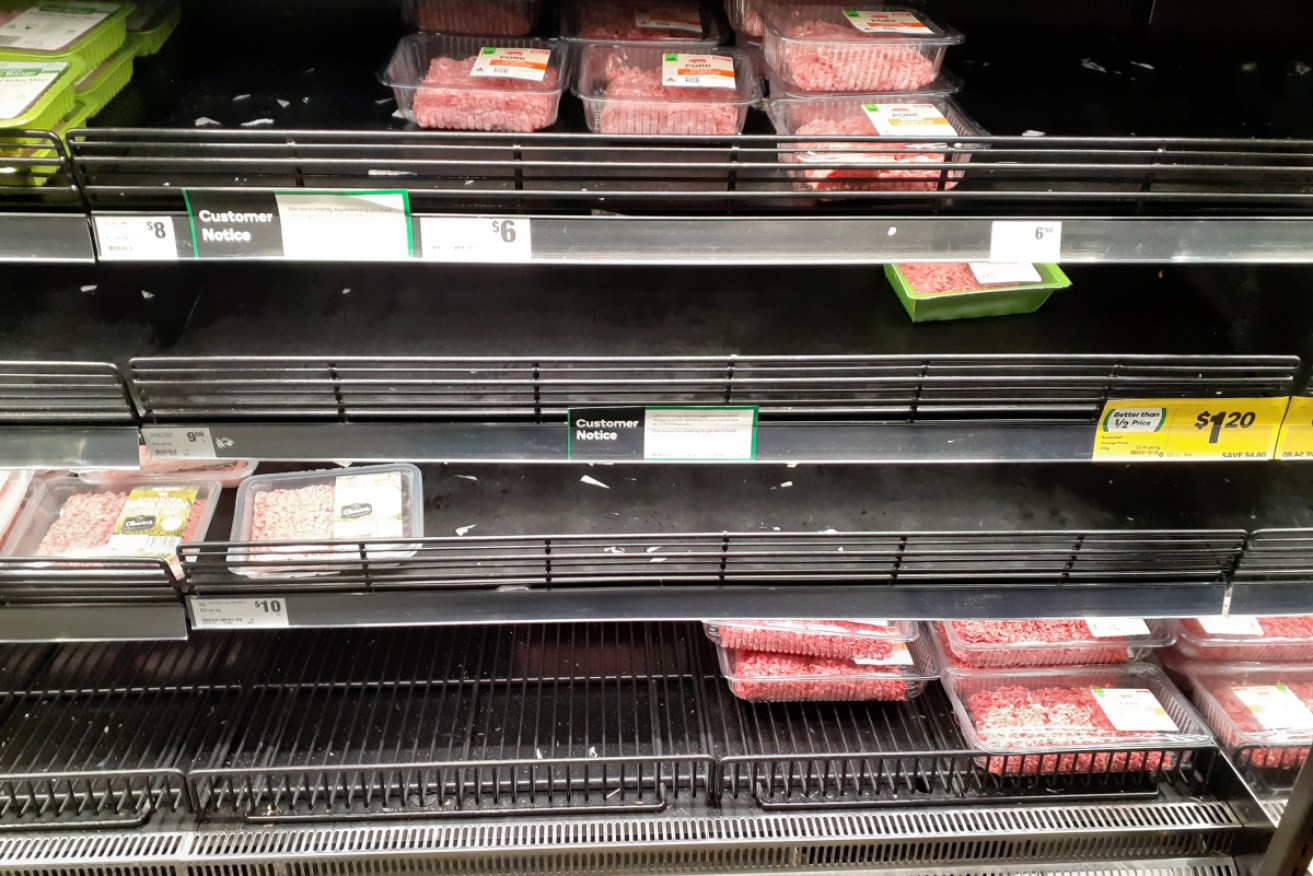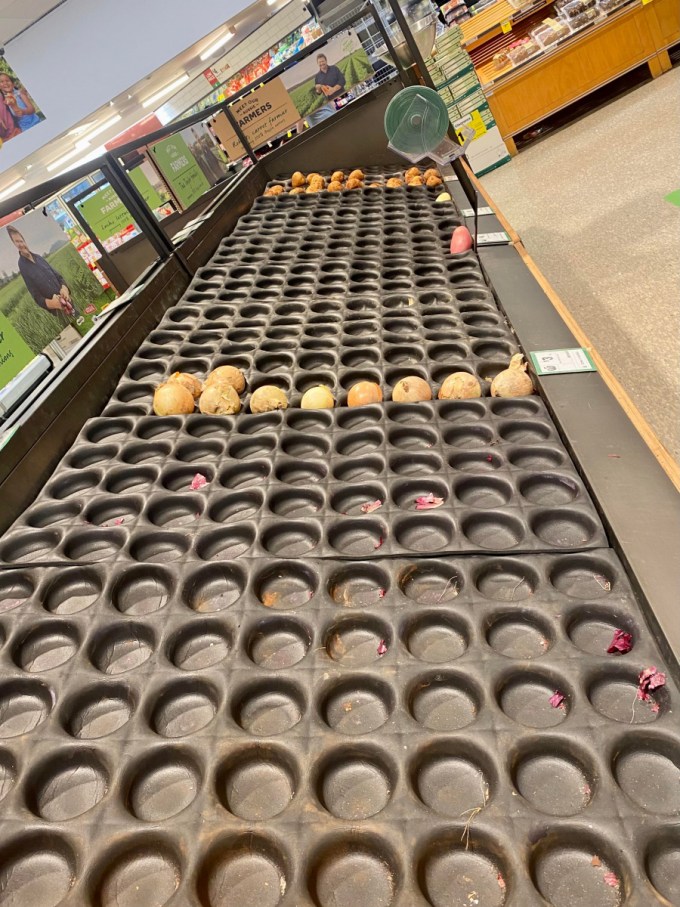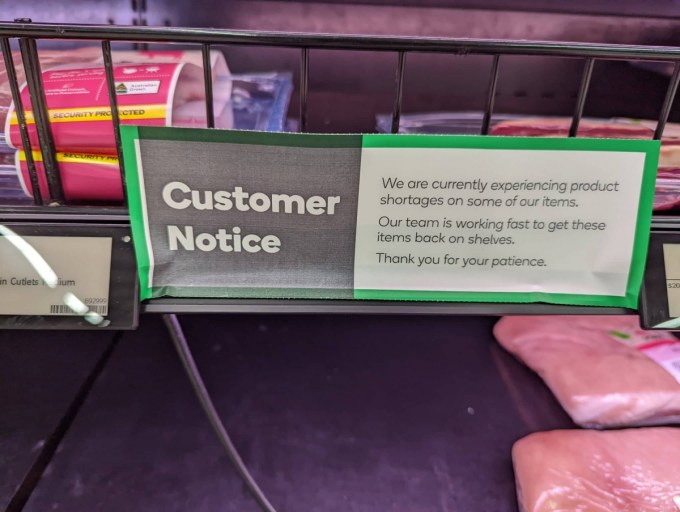‘Unsustainable’: Omicron food shortages to last weeks despite intervention


Shortages on the shelves during COVID created tense situations for staff. Photo: TND Photo: TND
Australians are being warned that a spate of supermarket food shortages will go on for weeks, with surging Omicron cases continuing to wreak havoc on the supply of fresh food across the country.
Shoppers encountered bare shelves when looking for red meat, onions and even painkillers on Monday as the Prime Minister flagged an easing of COVID-19 isolation rules to help big supermarkets restock their stores.
And the supply chain troubles, sparked by massive staff shortages, could continue into February.
The situation is so bad that Coles introduced a two-pack purchase limit on mince, chicken breasts, chicken thighs and sausages over the weekend, while Woolworths said supply of some foods continues to be “patchy”.
Supermarket bosses said shoppers would need to settle for products that they wouldn’t usually buy.
And even restaurants have been affected, with a KFC spokesperson saying on Monday that some stores have now begun selling a “reduced menu”.
National cabinet is set to intervene, with chief medical officer Paul Kelly saying governments are “adjusting levers” to allow essential food workers who are close contacts to return to work after testing negative.
Previously, these staff were required to isolate for at least seven days, a rule that supermarkets say has exacerbated widespread staffing issues.
Dr Kelly called the plan a “reasonable step” amid the Omicron surge, but unions have slammed the move, fearing it could spark more outbreaks.
‘Unsustainable’: Omicron strains food supplies
Unlike the panic-buying that caused shortages of toilet paper in 2020, the latest spate of empty shelves has been driven by a lack of staff in essential supply chains as hundreds of thousands of workers isolate.
Basically, supermarkets don’t have enough workers to load pallets, drive trucks and stock shelves, leaving their aisles and shelves emptier than usual.
Woolworths boss Brad Banducci said on Monday that up to 40 per cent of the chain’s distribution staff were isolating due to COVID-19, creating a “patchy” supply of essential food products like red meat and some fruit.
Coles has reported similar numbers of isolating supply chain staff, while data from the Australian Retailers Association (ARA) has found that 20 per cent of retailers have up to half of their workers in COVID-19 isolation.
Mr Banducci said food is still available in stores, but stressed shoppers may need to buy different products than they’re used to for a while.
“We’re really going into the peak of Omicron, so it’s in the next two to three weeks that we will have these spotty challenges inside the supply chain,” Mr Banducci told the ABC on Monday morning.
Shoppers have taken to social media to report shortages at their local grocery stores, with many saying vegetables like onions and long-life grocery products like paracetamol are hard to find in some locations.
Woolworths has already posted signs in stores apologising for delays.
Tony Ingpen, owner of an independent IGA supermarket in Victoria, said food supply chains have been left with “too few workers doing too much” as Omicron infections have decimated Australia’s essential workforces.
He said red meat has been particularly affected, with suppliers dealing with staff shortages due to COVID-19 isolation requirements.
Mr Ingpen told TND the worst may be yet to come, as the supermarket industry prepares for tourists in regional areas to return home to cities in late January, forcing a big shift in where food is needed across Australia.
Tweet from @G_Westgarth
“It’s unsustainable. Things are going to have to change,” Mr Ingpen said.
“Tourism areas are seriously under the pump [but] in three weeks it will swing back [to metro areas] … that will put a hell of a lot of strain on the supply chain.”
Both Mr Ingpen and Mr Banducci urged shoppers not to panic, which could make the problem worse, saying that there is still stock available in supermarkets, even if the products aren’t necessarily the first choice.
Governments ease isolation rules
Prime Minister Scott Morrison wants national cabinet to help ease the pressure on supermarket shelves, by relaxing isolation rules so that workers listed as close contacts can return to work if they test negative for the virus.
Workers with COVID-19 would still have to isolate, but the change is slated to allow tens of thousands of staff to return to work within a fortnight.
Mr Morrison said the relaxed rules would apply only to workers with jobs related to supplying food, but said the government is looking to extend it to others soon, including those in consumer-facing jobs.
He said Omicron is a “gear change” in Australia’s response to COVID, with daily infections across the country surpassing 71,000 on Monday.
“[Supermarkets] cannot operate in those sort of circumstances,” Mr Morrison told reporters in Canberra on Monday morning.
“We need to move fast to take these risk-based approaches to deal with this issue.”
The relaxed isolation rules were welcomed by supermarkets, but unions have argued the solution could make the crisis worse by allowing a pool of asymptomatic and infectious workers back into distribution centres.
Transport Workers Union secretary Michael Kaine said this could create new outbreaks and further slow the supply of essential food products.
“Scrapping isolation requirements for transport workers is beyond reckless – workers are being thrown to the wolves by a government that continues to ignore all the warnings,” Mr Kaine said in a statement.
“Sick drivers won’t get stock onto supermarket shelves any faster, but it will certainly help the virus hitch a ride across Australia.”
But Deakin University chair in epidemiology Catherine Bennett told TND that the new rules may not be riskier than the old approach, which forced a worker to isolate after being a close contact even after a negative test.
Professor Bennett said many workers are unaware they are a close contact until long after they have been to the workplace while infectious anyway, meaning the old rules weren’t necessarily preventing spread.
“It’s going from probably having an infectious [person] at work to having them there with testing in place,” Professor Bennett said.
“You’re always going to have some risk. Who knows, maybe [the new policy] is no more risk.”
















